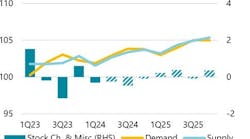Winter weather continued pushing up oil futures prices, despite talk among Organization of Petroleum Exporting Countries members over the weekend of possible production cuts early next year because of a saturated world market.
At the end of a 3-day international energy conference Sunday in Riyadh, Saudi Arabia, Al�odr�ez Araque, Venezuela's energy minister, warned that producers should prepare for an output reduction as early as January, if prices start to decline.
Rodriguez, who becomes the new secretary general of the Organization of Petroleum Exporting Countries on Jan. 1, said there is already a crude surplus of 1.4 million b/d, about 2% of the total global market. When crude inventories equal 90 days of consumption, he said, "We expect oil prices to drop."
At that same meeting, Abdullah Bin Hamad Al Attiyah, Qatar's energy minister, said he expects oil prices to plummet below $22/bbl in the second quarter of 2001.
OPEC members have increased production four times this year, a total of 3.7 million b/d, in a vain attempt to push down oil prices to the cartel's target range of $22-$28/bbl. They blame futures market speculation for keeping oil prices above that level.
On Friday, the December contract for benchmark US light, sweet crude gained 33� to $35.45/bbl on the New York Mercantile Exchange. The January contract also was up 57� to $35.03/bbl. But both contracts declined in after-hours electronic trading to $35.37/bbl and $34.33/bbl, respectively.
The December contract for natural gas rebounded by 30.2� to $6.10/Mcf on the NYMEX.
"Commodity prices, particularly natural gas, were quite volatile last week as they attempted to track weather forecasts, which took on a less bullish stance at midweek but then reversed a bit at the end of the week," Robert Morris, senior energy analyst at Salomon Smith Barney Inc., reported Monday.
He noted that the National Weather Service's 30-day forecast indicates a likely return to normal December temperatures for the key consuming Midwest and Northeast markets, after the last three mild winters. "Thus, demand for both natural gas and heating oil should continue to exceed last season throughout the remainder of the year," Morris said.
With heating oil inventories more than 30% below last year's levels, the December contract for that fuel increased 2.48� to $1.0788/gal Friday on the NYMEX. However, unleaded gasoline for the same month dipped 0.45� to 91.81�/gal.
In London, forecasts of severe cold weather for the US East Coast buoyed up the January contract for North Sea Brent crude by 31� to $33.08/bbl on the International Petroleum Exchange. Having rallied through resistance at $33/bbl, that market seems technically strong, brokers said.
The December contract for natural gas also gained 7� to the equivalent of $4.46/Mcf on the IPE.
On the Singapore Exchange, the January contract for North Sea Brent crude rose 31� to $33.08, and the February contract rose 34� to $32.22.
The price of OPEC's basket of seven crudes dropped 80� to $31.07/bbl Friday.
However, that basket averaged $31.79/bbl last week, up from $30.52/bbl the previous week.
So far this year, OPEC's basket price has averaged $27.74/bbl, up from $17.47/bbl in 1999 and $12.28/bbl in 1998.

